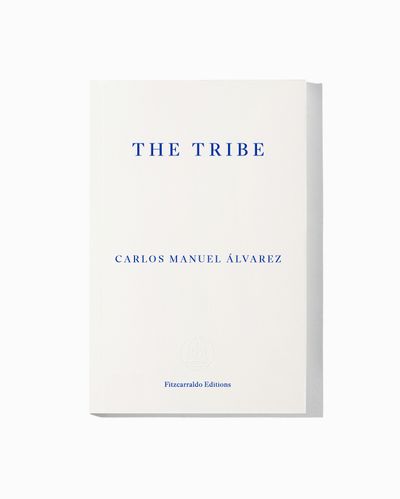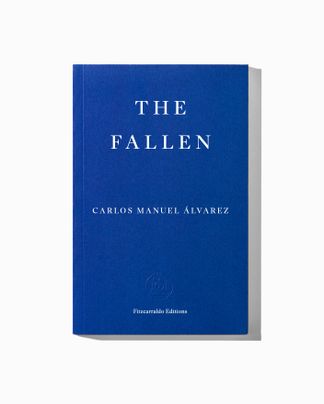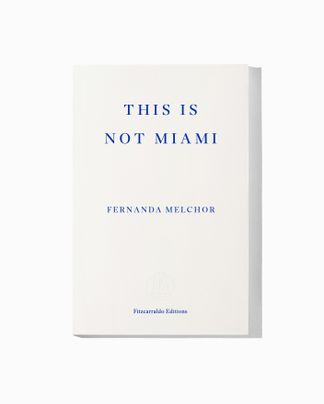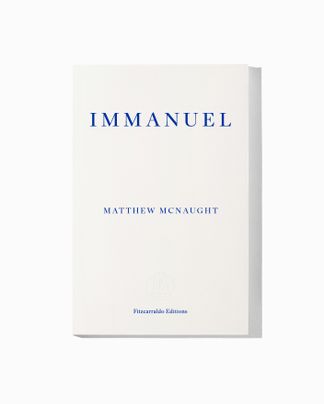Teeming with life and compulsively readable, the pieces gathered together in The Tribe aggregate into an extraordinary mosaic of Cuba today. Carlos Manuel Álvarez, one of the most exciting young writers in Latin America, employs the crónica form – a genre unique to Latin American writing that blends reportage, narrative non-fiction, and novelistic forms – to illuminate a particularly turbulent period in Cuban history, from the re-establishment of diplomatic relations with the US, to the death of Fidel Castro, to the convulsions of the San Isidro Movement.
Unique, edgy and stylishly written, The Tribe shows a society in flux, featuring sportsmen in exile, artists, nurses, underground musicians and household names, dissident poets, the hidden underclass at a landfill, migrants attempting to make their way across Central America, fugitives escaping the FBI, dealers from the black market, as well as revelers and policemen in the noisy Havana night. It is a major work of reportage by one of Granta’s Best of Young Spanish-Language novelists.

The Tribe
Translated by Frank Wynne with Rahul Bery
French paperback with flaps, 336 pages
Published 11 May 2022
The Tribe
Translated by Frank Wynne with Rahul Bery
POST-CASTRO CUBA, AN APPROXIMATION
I.
It is 17 December 2014. Barack Obama and Raúl Castro are announcing to the world that, after fifty-three years of hostile rift, the United States and Cuba are restoring diplomatic relations. Needless to say, this news is not as momentous to Americans as it is to Cubans. Hence the fact that the announcement leaves no gringos bewildered, wondering what is happening and what will happen next.
Cubans, on the other hand – we who effortlessly make an epic of the everyday, who don’t hesitate to declare the slightest skirmish or governmental whim a historic event – are instantly eaten up by questions, and frantically searching for some kind of clarity in our neighbours’ opinions in a way we never have before.
In the meantime, something exists that should not. Something that, in its present form, is unsustainable. A state of mind, perhaps: indecision, inertia, amnesia. Or the run-of-the-mill commonplace: our Cold War mindset, our deeply ideological sentimental education, a boundless bureaucracy, a ravaged social infrastructure. Beautiful, punch-drunk people that we are. In an attempt to take no risks, Cuba took the greatest risk of all: it took none. As though the government has spent decades instilling in us the belief that the historical race we were running was a marathon, only to suddenly decide, with the beginnings of the thaw, that actually it wasn’t. The distance was – and is – a hundred-metre sprint, and we were competing against a country guilty of doping.
The first great test of the schism that has just riven the Cuban people can be found in our psyche. Here was something that would not only change the course of our economic, cultural and social realities, which in itself was more than enough, but that forced us to reinvent our language, the words we commonly used, the concepts to which we had adapted ourselves as a nation. Official policy abruptly changed, and with it the relationship and the discourse each of us had with that power, whatever the feelings it inspired in us: trust, love, hatred, disappointment, enthusiasm, revulsion. On Mesa Redonda (the televisual incarnation of official Cuban policy), the talking heads who, only a week earlier, were still referring to the United States as an ‘imperial force’, now, with an equanimity verging on effrontery, used the word ‘neighbour’.
And they were right after all. From then on, the United States was to be our neighbour. A notion that, if voiced by some reckless soul as recently as last night, would have earned them the shameful label antipatriotic. The lines so routinely trotted out in history books: ‘Such-and-such a country went to bed Capitalist and woke up Communist,’ or ‘such-and-such a region went to bed feudal and woke up bourgeois,’ was literally true in this case. Once upon a time, Cuba had cherished the magnificent dream of the Revolution, and our tragedy stemmed from the attempt to prolong that dream. After a long, protracted suspension spanning five decades, we woke to find the great ontological questions once again rattling around our brain: how are we going to contend with the United States? What will come of this struggle? Will our country be better or worse?
—
But there’s a certain wariness to what’s happening. As though the euphoria has been internalized, as though euphoria has left us anaesthetized. We splutter. We babble clichés. Rapture is a rare and slightly irrational phenomenon for us, like an opiate ingested by the whole island, a collective drug smoked by everyone. And in a sense, our reaction seems reasonable. Having spent so many years marching for every triviality, waving banners and placards to celebrate as many anniversaries as possible, we now deserve to celebrate the other way, silence as a scream.
Today there was a prisoner swap in which three pro-Castro intelligence agents were returned in exchange for an American government contractor andan American intelligence officer of Cuban origin. Newspaper headlines trumpeted the return of the three agents – who, with two colleagues who had already returned, had been raised to the rank of heroes. The front pages showed them at home, reunited with their families. The three of them meeting with Raúl Castro. Their return to their districts. Their neighbours hugging them and and carrying them on their shoulders.
‘Los Cinco’ – The Cuban Five – were part of the Red Avispa – the Wasp Network. In 1998, they had been arrested by the FBI, charged with infiltrating an anti-Castro organization in Miami and given sentences of varying lengths. In Cuba, no mention was made of them until June 2001: the date on which they were sentenced and the beginning of yet another movement of national liberation, one that – if what was said was to be believed – marked the latest epic crusade in the ongoing Revolution.
For sixteen years, ‘Los Cinco’ have been a constant presence in our lives. They are mentioned on the radio in the context of the most unpredictable subjects. Danny Glover comments on their case. Naive hands daub portraits of their malnourished faces on city walls, school murals and the doorways of job centres. High-ranking politicians weave the subject into their speeches. Medal-winning sportspeople offer them their gold, silver or bronze. Absolutely everything is dedicated to ‘Los Cinco’.
—
A couple of days later, near the Estadio Latinoamericano, Silvio Rodríguez staged one of his free concerts in a poorer neighbourhood. The Cuban Five were in attendance. At the end of the performance, one of them grabbed the microphone and shouted two slogans: ‘¡Viva Cuba libre!’ and ‘¡Seguimos en combate!’ Obsolete mottos, things no one says any more. Slogans that date back eighteen years, to a time before Los Cinco’s arrest. They are unaware of everything that has happened in the interim, a period which they embody. And they are precisely what separates them from their country. The slogans we are familiar with are slogans that honour them. When the agent in question stepped up to the microphone, it was one slogan shouting another slogan.
What tone should we adopt when the speech patterns of fearless heroism have faded? Those same speech patterns that were the backbone of our education. An incantation unfit for purpose, one that we long to shake off, yet one that conjures the affection of an old friend, that inspires nostalgia. With a flicker of dread, we are discovering that the good news is usurping our voice, because our whole vocabulary is based on confrontation, on warlike imagery. On 17 December, Cubans are celebrating a possibility, something that may come to pass, but we are also suffering the heartache of a tribe laying its dialect to rest.
(…)
‘There is magic in these pages … [T]his book tells the actual story of Cuba as it exists today.’
— Jon Lee Anderson
‘Álvarez is very good on the absurdist rituals of zombie totalitarianism.… The Tribe vividly explores the more offbeat milieus and people of an extended Cuba.’
— Lorna Scott Fox, TLS
‘A journalistically rigorous picture of Cuban life, The Tribe is characterized by the gaps between Álvarez’s subjects. Using interviews and on-site reportage, Álvarez profiles people from various socioeconomic backgrounds, with contrasting political affiliations. The sketches he compiles demonstrate a wide range of experiences and perceptions of Cuba. Álvarez allows the juxtapositions between these profiles to reveal a country that looks different from person to person…. A nation is, after all, nebulous – the only way to make an honest portrait is to approach it from myriad perspectives. In The Tribe, the resulting mosaic is rich for its nuance and contradictions.’
— Morgan Graham, Chicago Review of Books
‘That rarest of books about a people that achieves a restorative function without idling in a documentarian mode, The Tribe’s gift to its subjects is not raising them as a hot topic, but by preserving their dignity in spite of the headlines.’
— J. Howard Rosier, Words Without Borders
‘Àlvarez has smuggled an important ethnographic work inside the form of an entertaining and well-written crónica.’
— Alex Payne, Buzz Magazine
‘Álvarez does not try to instruct or speculate. He does not write on whether the Revolution succeeded or failed. He does not determine whether the leader was a hero or a tyrant. His book is not an explanation: it is … the history of a country told through its people.’
— María Teresa Hernández, AP News
‘This is one of those books you’ll read in a single sitting. Conveying readers to the turbulent landscapes of Cuba’s recent political past, it offers a refreshing assessment of the country outside of typical historic tropes, giving voice to ordinary Cubans, from artists and nurses to underground musicians and dissident poets.’
— Lucy Kehoe, Suitcase Magazine
‘[The] sensory experience created by the writing style also warrants credit to the translator Frank Wynne. A translation that lives, breathes, has rhythm, gives you a fashion show, captures a very community-based, laced-with-history slang is no mean feat and given the underlying form of the text, the translation has to be very adaptable too. Their cumulative skill results in a treat … The Tribe really is a powerful and multi-faceted book.’
— Serena Chang, Sounds and Colours
Praise for The Fallen
‘A beautiful and painful novel that demonstrates the power of fiction to pursue the unutterable.’
— Alejandro Zambra, author of Multiple Choice
‘A war foretold that never takes place. A death foretold that never takes place. And in the middle of this is the inevitable collapse of a family and a country. The Fallen is a subtle, intelligent and profoundly moving novel which sketches, in elegant and thoughtful prose, a rarely seen Cuban landscape.’
— Alia Trabucco Zerán, author of The Remainder
‘The best in Latin American literature is here: with the precocious skill of someone who is a paragon of narrative resources and sensitivity, Carlos Manuel Álvarez vividly portrays the only identity that really matters: not national, but human. The Fallen is a museum of solitude and of the cracks separating our inner world from the one we live in and from those with whom we coexist.’
— Emiliano Monge, author of Among the Lost
Carlos Manuel Álvarez is the author of The Fallen and The Tribe, and has written for the New York Times, El País and the Washington Post. He was selected as one of the twenty best Latin American writers born in the 1980s at the Guadalajara Book Fair; he was included in the Bogotá39 list of the best Latin American writers under 40; and he was chosen by a panel of judges for inclusion in Granta’s second Best Young Spanish-Language Novelists issue. He is the recipient of the Anagrama Chronicle Prize for Los Intrusos and the Prix Carbet de la Caraïbe et du Tout-Monde for the French translation of his novel The Fallen.
Frank Wynne has translated works by authors including Michel Houellebecq, Patrick Modiano, Virginie Despentes, and Jean-Baptiste Del Amo. His work has earned many awards, including the IMPAC Prize, the Independent Foreign Fiction Prize, and the Premio Valle Inclán.
Rahul Bery is based in Cardiff and translates from Spanish and Portuguese into English. He has translated novels by Afonso Cruz, David Trueba and Simone Campos and his shorter translations have been published in the TLS, The White Review, Words Without Borders, Granta and elsewhere. He was the British Library’s translator in residence from 2018-2019 and his translation of David Trueba’s Rolling Fields was shortlisted for the 2021 Translator’s Association First Translation Prize.




